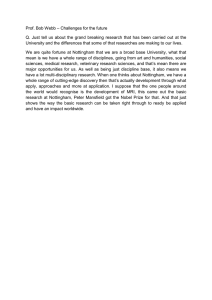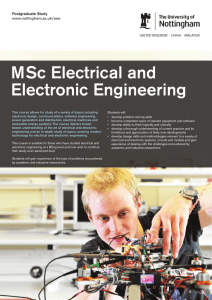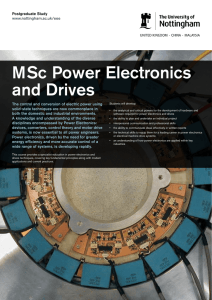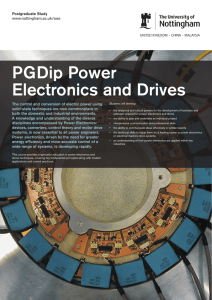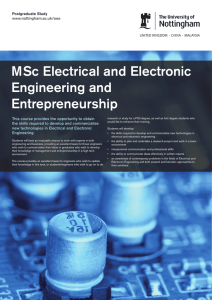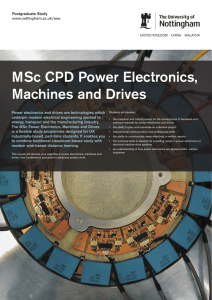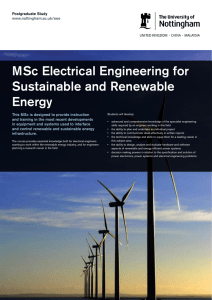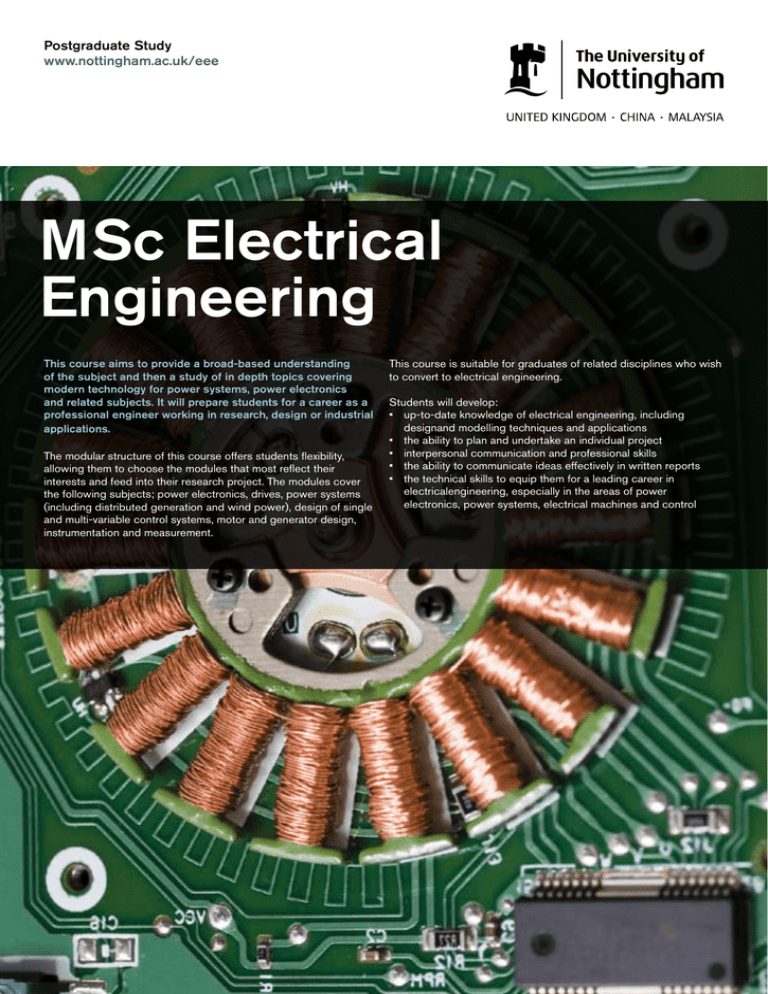
Postgraduate Study
www.nottingham.ac.uk/eee
MSc Electrical
Engineering
This course aims to provide a broad-based understanding
of the subject and then a study of in depth topics covering
modern technology for power systems, power electronics
and related subjects. It will prepare students for a career as a
professional engineer working in research, design or industrial
applications.
The modular structure of this course offers students flexibility,
allowing them to choose the modules that most reflect their
interests and feed into their research project. The modules cover
the following subjects; power electronics, drives, power systems
(including distributed generation and wind power), design of single
and multi-variable control systems, motor and generator design,
instrumentation and measurement.
This course is suitable for graduates of related disciplines who wish
to convert to electrical engineering.
Students will develop:
• up-to-date knowledge of electrical engineering, including
designand modelling techniques and applications
• the ability to plan and undertake an individual project
• interpersonal communication and professional skills
• the ability to communicate ideas effectively in written reports
• the technical skills to equip them for a leading career in
electricalengineering, especially in the areas of power
electronics, power systems, electrical machines and control
Postgraduate Study
www.nottingham.ac.uk/eee
MSc Electrical Engineering
Course structure
This course is taught on a full-time basis over one year and consists
of 120 credits of taught modules and a 60 credit independent
research project. Normally 60 credits of taught modules are taken
per semester, however it is possible to take a 55/65 credit split.
Please be aware modules may be subject to change. Modules are
chosen from a wide range of electrical engineering topics according
to students specific interests and requirements.
Modules
•
•
•
•
•
•
•
•
•
•
•
•
•
Control Systems Design
Power Electronic Design
Power Networks
Electrical Machines
Instrumentation and Measurement with/without project
Advanced Control System Design with project
Energy Conversion for Motor and Generator Drives
FACTS and Distributed Generation
Advanced AC Drives
Advanced Power Conversion
Technologies for Wind Generation
Power Systems for Aerospace, Marine and Automotive Applications
Advanced Electrical Machines
Individual project
Following the successful completion of the taught modules, an
individual research project is undertaken during the summer term.
The project will demand the completion of a major piece of work on
an advanced technical topic.
Previous projects have included:
• Modular converter topologies for power system applications
• Predictive control for an uninterruptable power supply
• Power systems stability enhancement using Static Converter
(STATCOM)
• Sensorless permanent magnet motor drives for more electric aircraft
applications
Funding opportunities
Funding options can be found at:
Home and EU: www.nottingham.ac.uk/fundingPG
International: www.nottingham.ac.uk/internationalstudents/scholarships
Employment prospects
Students of this course have entered into roles in design and
development within major international companies or government
agencies, obtained consultancy posts with leading contract
consultant companies and moved into successful academic
careers.
Entry requirements
Applicants should have at least a high 2.2 (lower second class honours
degree) or international equivalent in a related subject from a recognised
university.
English language requirements:
• IELTS score of at least 6.0 with a minimum score of 5.5 in individual
elements
Other qualifications are accepted.
How to apply
Candidates are encouraged to apply online at:
www.nottingham.ac.uk/pgstudy/apply
Contact us
For further information, please contact:
Graduate Admissions
Department of Electrical Engineering
t: +44 (0)115 951 4081
e: eng-student-support@nottingham.ac.uk
w: www.nottingham.ac.uk/eee
The University of Nottingham has made every effort to ensure that the information in this
flyer was accurate when published. Please note, however, that the nature of the content
means that it is subject to change from time to time, and you should therefore consider
the information to be guiding rather than definitive.
© The University of Nottingham 2014. All rights reserved.

